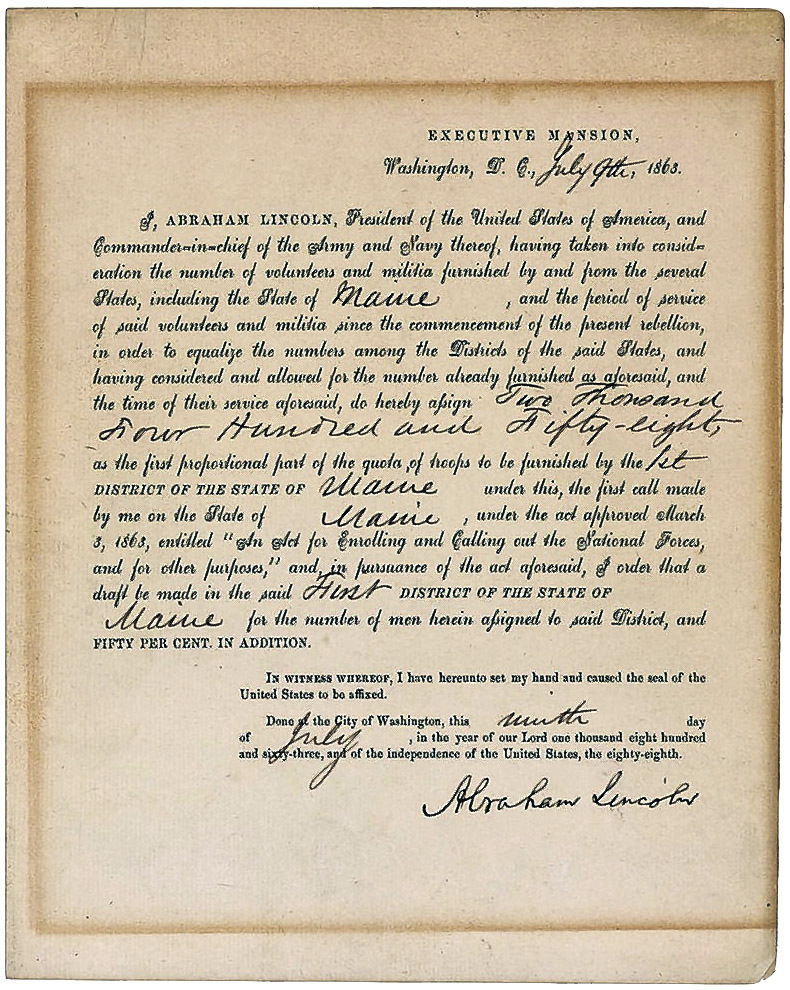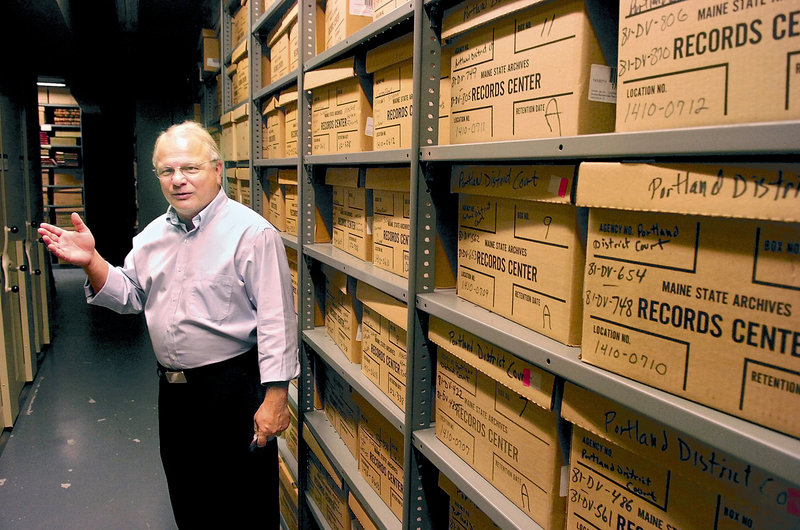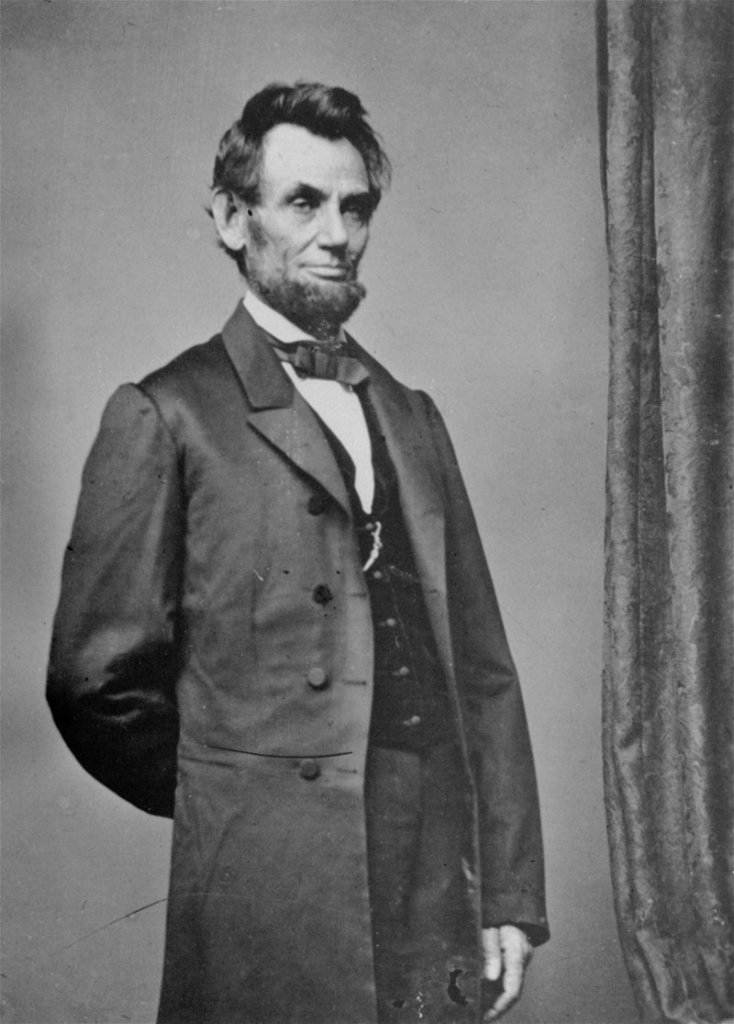It began as an online auction. But from where Maine State Archivist David Cheever sits, it’s a crime in progress.
“It’s a public document,” declared Cheever on Tuesday after viewing an ever-so-tantalizing slice of Maine’s heritage on his computer in Augusta. “And public documents aren’t for sale.”
Especially when said document happens to be an original, hand-signed order by President Lincoln establishing Maine’s first military draft, on July 9, 1863 – just a week after Maine’s own Col. Joshua Chamberlain helped save the Union at Gettysburg.
Who’s cashing in on it?
Only the auctioneer, RR Auction of Amherst, N.H., knows – at least for now.
How did it fall into private hands?
Good question.
How much is it worth?
Well, the 26 bids submitted since its posting last month topped out at $8,983 as of late Tuesday — and that price could easily double by the time the auction closes one week from today.
Or not.
A little history:
Back in the summer of 1863, with the Civil War well into its third year and no end in sight, the all-volunteer Union Army found itself running dangerously low on soldiers.
Lincoln, empowered by “An Act for Enrolling and Calling Out the National Forces” passed by Congress that spring, signed and dispatched orders to every congressional district in the northern states (Maine had five at the time) setting a quota for each district to help replenish the ranks.
Lincoln’s order to Maine’s 1st District – the one now for sale – called for “two thousand, four hundred and fifty-eight” troops to be mobilized through a draft pool composed of that number “and fifty percent in addition.”
“Just think of the stories behind that single sheet of paper,” marveled Portland historian and former state Rep. Herb Adams upon hearing of the document Tuesday. “The lives lived and lost. Families in grief. And a country torn in two.”
Critical as it may have been to winning the war, Lincoln’s mandate did not go over well.
In New York City, the Draft Riots raged for four full days before Union troops, hastily dispatched from the battlefield at Gettysburg, finally restored order. An estimated 120 people died; 2,000 were injured.
Here in Maine, a smaller disturbance broke out in the small town of Kingfield — fueled by widespread anger that those with money and influence could dodge the draft with a $300 “commutation fee.” Others, including the legendary Maine politician James G. Blaine, simply hired someone to take their place.
“Many of the subs hired in Maine and especially in the 1st District were Irish immigrants, some directly off the boat,” noted Adams. “Agents just waited at the docks and had them sign papers with no idea what they were doing. Many a poor Irish boy died so a rich man’s son could stay home.”
What’s more, Adams said, rural Maine crawled with “bounty jumpers,” who collected cash by enlisting in one town, only to vanish and do it again somewhere else. Adding to the mayhem were “unscrupulous dealers in fake documents” who, for a fee, could provide any number of escapes from military conscription.
In short, observed Adams, “an entire underground” sprouted from that same piece of paper now under the hungry eyes of more than two dozen collectors with cash in hand.
Which brings us back to the auction.
State Archivist Cheever said he’s never seen anything like the Maine draft order, which was brought to my attention during the weekend by a reader who saw it online and suggested “it would be a great item for the Maine (State) Museum in Augusta.”
Good call.
Maine, Cheever said, has long had a “replevin” law that enables the state to reclaim items that never should have left public custody in the first place.
Better yet, the statute was significantly strengthened in 2010 (Adams sponsored the amendment) after Maine lost a battle in the Virginia courts to retrieve a copy of the Declaration of Independence that was found in an attic in Wiscasset.
That gem sold for $475,000.
“We are notifying the Office of the Attorney General that we believe we have a public document that is being offered for sale in another state and we believe it is a Maine document that belongs here,” Cheever said. “Public documents are public documents — they are not subject to barter or sale.”
Contacted at RR Auction, Executive Vice President Bobby Livingstone said he can’t reveal who claims to own “Item 85 — Abraham Lincoln,” which is expected to fetch $15,000 or more by the time the gavel falls next week.
But, he added, his firm will take Maine’s challenge “very seriously.”
Meaning?
“We withdraw it from sale while ownership is sorted out,” he replied.
Another good call.
“What makes these things so valuable to collectors is how they changed people’s lives,” noted Maine Secretary of State Matthew Dunlap, who will join with Cheever in demanding the document’s return. “But it’s also what makes them so valuable to us as a people. It tells us who we are, where we’ve been.”
Meaning that, as lost treasures go, this is a cool find?
“It’s way cool,” replied Cheever.
Echoed Adams, “All Mainers should like to see it. Home, where it belongs, and safely preserved.”
Long live the historians.
Bill Nemitz can be contacted at 791-6323 or at:
bnemitz@pressherald.com
Send questions/comments to the editors.






Success. Please wait for the page to reload. If the page does not reload within 5 seconds, please refresh the page.
Enter your email and password to access comments.
Hi, to comment on stories you must . This profile is in addition to your subscription and website login.
Already have a commenting profile? .
Invalid username/password.
Please check your email to confirm and complete your registration.
Only subscribers are eligible to post comments. Please subscribe or login first for digital access. Here’s why.
Use the form below to reset your password. When you've submitted your account email, we will send an email with a reset code.